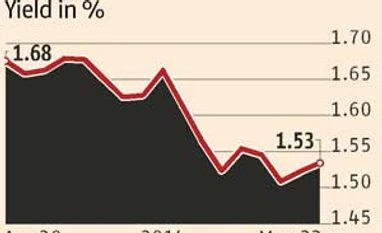Since April 30, spreads have shrunk by 10-100 basis points for various five-year papers. Due to this, it is probably the right time for Indian firms in need of funds in the next one year to go and tap the international bond market. Much of the funds that corporates might raise could get utilised in re-financing the old credit, helping bring down interest costs and increase tenure for re-payments, said bankers.
“The investor interest in Indian offshore bonds continues to be strong. The recent electoral verdict has provided a stability-led momentum, leading to further tightening of spreads. We expect quality issuers from India to receive a strong investor demand,” said Manmohan Singh, managing director (debt capital markets-Asia), RBS.
Spread is the difference between the global bond yields, listed by an Indian firm and the US Treasury of similar maturity tenure.
Sanjeev Lall, head of institutional banking group, DBS Bank, said the easing of risk spreads on Indian paper reflects genuine change in the market perception about the Indian economy and business. There is hope that the new government would take firm steps to spur economic growth.
Lall said the market perception for better future is also backed by assessment by credit rating agencies. Moody's has described a clear majority for the BJP as “credit-positive”.
According to experts, global investors are looking for opportunities to invest in emerging markets. With China’s growth slowing down, India is a preferred destination for investors.

A further compression in spreads will depend upon inflation control and steps taken by the government to speed up reforms. “The spreads could ease further depending on future course of policies. While Indian companies will take the benefit of the relatively cheap money, it will be more for refinancing existing debt to reduce interest cost burden and extend tenure of credit. Fund-raising for capital expenditure might begin to happen only after a few quarters,” said a senior executive involved in syndication at a foreign bank.
However, it is agreed that currently it is cheaper for Indian firms to raise funds globally, as compared to a few months ago. “Currently, Indian corporates and banks can probably raise funds by about 25-50 basis points in the coupon rate. A new issuer will probably raise funds at a lower coupon than what they would have paid in December,” said an issue arranger.
You’ve hit your limit of {{free_limit}} free articles this month.
Subscribe now for unlimited access.
Already subscribed? Log in
Subscribe to read the full story →

Smart Quarterly
₹900
3 Months
₹300/Month
Smart Essential
₹2,700
1 Year
₹225/Month
Super Saver
₹3,900
2 Years
₹162/Month
Renews automatically, cancel anytime
Here’s what’s included in our digital subscription plans
Access to Exclusive Premium Stories Online
Over 30 behind the paywall stories daily, handpicked by our editors for subscribers


Complimentary Access to The New York Times
News, Games, Cooking, Audio, Wirecutter & The Athletic
Business Standard Epaper
Digital replica of our daily newspaper — with options to read, save, and share


Curated Newsletters
Insights on markets, finance, politics, tech, and more delivered to your inbox
Market Analysis & Investment Insights
In-depth market analysis & insights with access to The Smart Investor


Archives
Repository of articles and publications dating back to 1997
Ad-free Reading
Uninterrupted reading experience with no advertisements


Seamless Access Across All Devices
Access Business Standard across devices — mobile, tablet, or PC, via web or app



)
